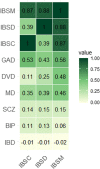Shared genetic architecture between irritable bowel syndrome and psychiatric disorders reveals molecular pathways of the gut-brain axis
- PMID: 37528461
- PMCID: PMC10391890
- DOI: 10.1186/s13073-023-01212-4
Shared genetic architecture between irritable bowel syndrome and psychiatric disorders reveals molecular pathways of the gut-brain axis
Abstract
Background: Irritable bowel syndrome (IBS) often co-occurs with psychiatric and gastrointestinal disorders. A recent genome-wide association study (GWAS) identified several genetic risk variants for IBS. However, most of the heritability remains unidentified, and the genetic overlap with psychiatric and somatic disorders is not quantified beyond genome-wide genetic correlations. Here, we characterize the genetic architecture of IBS, further, investigate its genetic overlap with psychiatric and gastrointestinal phenotypes, and identify novel genomic risk loci.
Methods: Using GWAS summary statistics of IBS (53,400 cases and 433,201 controls), and psychiatric and gastrointestinal phenotypes, we performed bivariate casual mixture model analysis to characterize the genetic architecture and genetic overlap between these phenotypes. We leveraged identified genetic overlap to boost the discovery of genomic loci associated with IBS, and to identify specific shared loci associated with both IBS and psychiatric and gastrointestinal phenotypes, using the conditional/conjunctional false discovery rate (condFDR/conjFDR) framework. We used functional mapping and gene annotation (FUMA) for functional analyses.
Results: IBS was highly polygenic with 12k trait-influencing variants. We found extensive polygenic overlap between IBS and psychiatric disorders and to a lesser extent with gastrointestinal diseases. We identified 132 independent IBS-associated loci (condFDR < 0.05) by conditioning on psychiatric disorders (n = 127) and gastrointestinal diseases (n = 24). Using conjFDR, 70 unique loci were shared between IBS and psychiatric disorders. Functional analyses of shared loci revealed enrichment for biological pathways of the nervous and immune systems. Genetic correlations and shared loci between psychiatric disorders and IBS subtypes were different.
Conclusions: We found extensive polygenic overlap of IBS and psychiatric and gastrointestinal phenotypes beyond what was revealed with genetic correlations. Leveraging the overlap, we discovered genetic loci associated with IBS which implicate a wide range of biological pathways beyond the gut-brain axis. Genetic differences may underlie the clinical subtype of IBS. These results increase our understanding of the pathophysiology of IBS which may form the basis for the development of individualized interventions.
Keywords: Genetic overlap; Gut-brain axis; Irritable bowel syndrome; Psychiatric disorder.
© 2023. The Author(s).
Conflict of interest statement
Ole A. Andreassen is a consultant for HealthLytix and has received speaker’s honoraria from Lundbeck and Sunovion. Srdjan Djurovic has received speaker’s Honoria from Lundbeck. Ander M. Dale is a founder of and holds equity in CorTechs Labs and serves on its scientific advisory board. He is also a member of the Scientific Advisory Board of Human Longevity, Inc., and receives research funding from General Electric Healthcare and Medtronic, Inc. The terms of these arrangements have been reviewed and approved by the University of California San Diego in accordance with its conflict of interest policies. The remaining authors declare that they have no competing interests.
Figures







